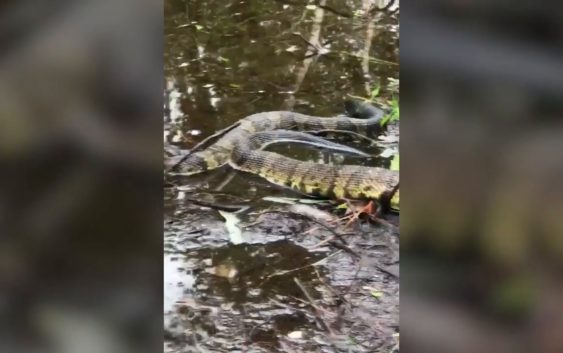- Rock Hill storm damage costs are 'somewhere around $5 million.' That number doesn't include damage to personal property
- Rock Hill storm damage costs are 'somewhere around $5 million.' That number doesn't include damage to personal property
- ‘Somewhere around $5 million’ | Rock Hill officials see major storm damage costs
- The deadliest tornadoes to ever hit Austin
- Whiteville resident recalls events from Tuesday nights tornado
NC firefighter thought he saw gator in hurricane flood waters. It was venomous snakes

Reports that venomous snakes could turn up in Hurricane Florence flood waters proved true Sunday for a firefighter working on North Carolina’s Topsail Island.
North Topsail Beach firefighter Bradley Thomas Dixon posted a video Sunday on Facebook showing not one, but two cottonmouths wallowing in the muddy flood waters. The video had been viewed 49,000 times and shared hundreds of times by Monday.
Dixon said he “just walked up on” the snakes while checking storm damage at a disc golf course.
“When I jumped down from a fallen tree on a remote part of the disc golf course, I instantly saw them and thought it was a gator,” he told McClatchy.
“Startled, I jumped back on the log. The snakes did not move, so I videoed them because it was one of the most intense moments I have experienced in a while. …The cottonmouths were probably washed in from a swampy area and were dazed and stunned.”
He believes the pair were “sunning after a long three days of rain and flooding.”
A day earlier, Hurricane Florence had covered the course with six inches of rushing water, he said. The water receded Sunday, leaving hundreds of fallen trees and “pools of water everywhere.”
The storm’s aftermath created perfect conditions for snakes, he said, “so I will be watching my feet closely until things reach equilibrium again.”
Experts warned last week that venomous snakes in the Carolinas could turn up in unexpected places due to Hurricane Florence’s flood waters, reported the Myrtle Beach Sun News.
Cottonmouths, also known as water moccasins, are found in the eastern half of North Carolina. The snake gets its name from the white color that is revealed when it opens its mouth to defend itself, according to NCWildlife.org.
The cottonmouth is one of one of six species of venomous snakes found in N.C., including copperheads and rattlesnakes. The adults average 4 feet long, but records show a record 74-inch cottonmouth was once captured in the state, said NCWildlife.org.
Mark Price: 704-358-5245, @markprice_obs